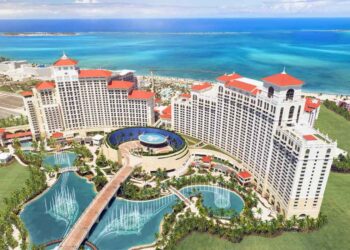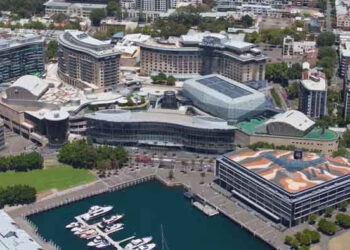Genting Group Chairman Lim Kok Thay was in Jeju this week to herald a new era for South Korea as a go-to destination for the booming China travel market.
The occasion was Monday’s ribbon-cutting for Genting Jeju Casino at the popular tourist island’s newly remodeled Hyatt Regency Jeju Hotel. It is the first new casino to open in the country in years.
The hotel, appropriately overlooking the East China Sea, contains 223 rooms and suites along with a collection of new restaurants and leisure facilities. The casino, small by Macau or Manila or Singapore standards—29 table games and 16 slot machines—represents a modest US$117 million investment for Genting. But it is only the first fruit of a much larger vision for the country—one the national government in Seoul is now actively encouraging.
Speaking through publicly traded subsidiary Genting Hong Kong, the Malaysia-based resort giant characterized the opening as “a new phase of the Group’s presence and participation in the Korean casino industry”.
The centerpiece of that plan is a US$2.2 billion luxury residential and tourist-oriented commercial complex—gaming included, of course—the Group is pursuing through its listed Genting Singapore subsidiary, owner of Singapore’s Resorts World Sentosa, and its partner in the new Hyatt casino, Chinese property conglomerate Landing International. Pending approvals from the local government, the partners have their sights set on breaking ground in the second quarter.
Landing, too, like many deep-pocketed Chinese companies, sees South Korea as a springboard for diversification on a world stage.
“The opening of Genting Jeju Casino mars a big step forward on the company’s development of integrated resort and tourism properties in the global markets,” said Landing Chairman Yang Zhi Hui.
Those plans include the acquisition of a casino in another popular Korean tourism spot, the ski country of the northeast where the 2018 Winter Olympics will be held. Landing has earmarked $112 million to buy the Alpensia Casino at the Holiday Inn in Pyeongchang in Gangwon Province. Gangwon is home to the only casino in South Korea open to Koreans, Kangwon Land, which, not surprisingly perhaps, is also the largest and most lucrative casino in the country.
South Korea saw visitation from China surge 51.5% from 2012 to 2013, and grew another 41% grow another 40.9% in 2014 to more than 6 million, according to the state-run Korea Tourism Organization. Including visitors from Hong Kong and Taiwan, the number of Chinese-speaking tourists is expected to surpass 7.4 million this year, accounting for more than half of all foreign arrivals. The country is already the third-most popular destination for mainland Chinese after Macau and Hong Kong, and they’re feeding a tourism industry whose income is expected to grow more than 21% this year to $17.6 billion, and the KTO says Chinese will comprise its biggest spenders.
“The [close] proximity is one of the great advantages that draws Chinese tourists to Korea,” an official with the KTO recently told the English-language Korea Herald. “We saw more people coming from inland provinces as we focus our travel promotions on inland Chinese cities. The influence of the Korean [cultural] Wave has definitely been a strong attraction for Chinese tourists.”
Clearly, the government has not been slow in grasping the implications. For one, it has extended the visa-free access Chinese nationals enjoy in Jeju—currently home to eight of the country’s 16 foreigners-only casinos—to Yangyang International Airport in Gangwon, which is served by charter flights from 12 cities in China, including Beijing, Shanghai and Guangzhou.
Landing sees the Olympics as an “enormous marketing opportunity” for the Alpensia and plans to expand the casino, which houses 42 slots and EGMs, with 70 table games.
“The acquisition will increase the group’s market shares and branding in the Korean casino industry, which will foster a positive synergistic effect on the other businesses of the group in Korea,” the company said.
The government plans to speed this process along by revising investment limits to allow major Korean corporations to participate in the resort industry. Existing rules stipulate that foreign investors most hold at least 51% of such projects before local players can join in.—“Now, anybody, including large companies such as Samsung and Hyundai, can participate in the projects through fair competition,” a government official explained.
The reforms envision the approval of two new destination-scale resorts with casinos this year encompassing an additional 5,000 hotel rooms and KRW300 billion of investment (US$275 million) in four new duty-free shopping areas, three in Seoul and one in Jeju, which could be expanded further based on growth in foreign tourism. The country’s 16 metropolitan-area duty free shops have seen their revenue rise from KRW3 trillion in 2011 ($2.76 billion) to KRW4.4 trillion October last year.
Encouraged by this new liberalism, two integrated resorts with casinos are already in development in a special economic zone on Yeongjong island, the site of Incheon International Airport, the main gateway for foreign arrivals, located about 30 kilometers from Seoul.
The first, a joint venture between Paradise Group, the leader of the foreigners-only market, and Japanese pachinko giant Sega Sammy is slated to open in 2017 at an initial cost of US$750 million. The second, a joint venture similarly priced and led by US casino operator Caesars Entertainment, struck a $95 million deal late last year to acquire land for a resort scheduled to break ground in the zone this year ahead of a planned opening in 2018.
Global names of the likes of Las Vegas Sands are taking a hard look at the market, albeit with reservations about the prohibition on domestic play, foreigner-only policy, but outside interest is definitely on the upswing. Hong Kong-based retail and property conglomerate Chow Tai Fook Enterprises is one, and in November the conglomerate signed a letter of intent with Incheon City to build in Yeongjong.
Operators could be selected in the latter half of this year for the two resorts sanctioned under the new investment rules. Groundbreakings would follow shortly after with a view to openings in 2020.
In all, the government forecasts the investments will stimulate the economy by more than US$23 billion and unleash spending of KRW16.8 trillion of funds already earmarked while attracting another KRW8.5 trillion won in investment in new businesses related to tourism and supporting infrastructure.






























